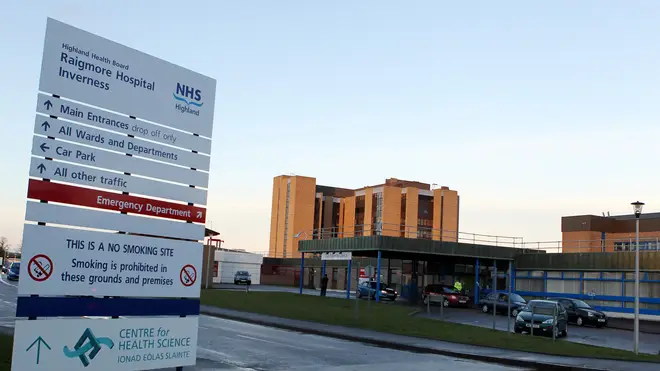
Ian Payne 4am - 7am
6 July 2021, 18:05

A hospital in Inverness has reached capacity and been placed at "code black status" amid a "significant" increase in Covid-19 cases.
All non-urgent elective surgery at Raigmore Hospital has been cancelled, as Covid cases rise and an increasing number of staff are told to self-isolate.
"The impact of this at Raigmore Hospital, in particular, has been significant over the past few days," said NHS Highland.
"We have reached capacity in the hospital, we have long waits in our Emergency Department and we know people requiring urgent care will still need to come in for treatment.
"As a result, the hospital is currently at code black status."
Read more: Close contact self-isolation scrapped for the fully vaccinated - but not until August
Read more: What is the Lambda Covid variant? UK stats, symptoms and more
The statement went on: "The impact on services is also being experienced across our community teams both in Highland and Argyll and Bute.
"Urgent work is taking place to ensure we can treat our patients appropriately and compassionately.
"Medical, surgical and clinical support teams are meeting regularly to agree the actions that must be taken and discuss what more can be done to reduce the pressure on services within the hospital."

Caller on Covid: 'I think we're facing some very dark days ahead.'
All non-urgent elective surgery has been cancelled, as has outpatient activity, with the exception of cancer, urgent, Allied Health Professional and diagnostics activity.
The health board said that cancer and urgent cases will continue to be treated and staff will also, where possible, carry on with orthopaedic and day case work.
Read more: Wearing face masks set to become voluntary after step four, Boris Johnson confirms
Read more: Entire England cricket team goes into isolation after seven positive Covid tests
"We are doing all we can to safeguard services but we have had to make the difficult decision to cancel non-urgent work which I know many will find upsetting and frustrating," said Dr Boyd Peters, medical director for NHS Highland, adding that they were "very sorry" that they had to do it.
"Covid is on the increase again but what is different this time is that we are seeing more medical and surgical activity at the same time.
"We also have a high number of staff having to self-isolate… We are doing everything we can to minimise that but the pressure on the system is significant."
The health board said it has stood up its internal incident command to manage its response to the "significant pressures" currently present across health and social care.

Sadiq Khan says mask-wearing 'the most unselfish act you can do'
Scotland currently has the highest rate of Covid infections in Europe, driven partially by local surges in the Delta variant, for example in Glasgow.
Daily cases in Scotland are now falling but the number of patients in hospital is continuing to rise.
Finance Secretary Kate Forbes said Scotland's easing of restrictions on July 19 will be different to England's.
The country is expected to move to Level 0 on July 19, which will see up to eight people allowed to meet in private homes, but some rules such as mask-wearing are expected to stay in place even after August 9 when Scotland plans to move "beyond level 0".
Read more: School bubbles to end and pupils will only isolate if positive for Covid under new plans
Read more: More deaths than births in UK for the first time in almost 50 years - ONS data
Dr Lewis Morrison, British Medical Association Scotland chairman, said: "The news to come out of NHS Highland is extremely concerning and is a stark reminder - if anyone needed it - of just how overstretched our NHS currently is - and has been, even pre-pandemic.
He added: "NHS Highland may be something of a warning light for much of our NHS and reflects the experience members are increasingly reporting to us, highlighting just how susceptible to disruption many services are right now."